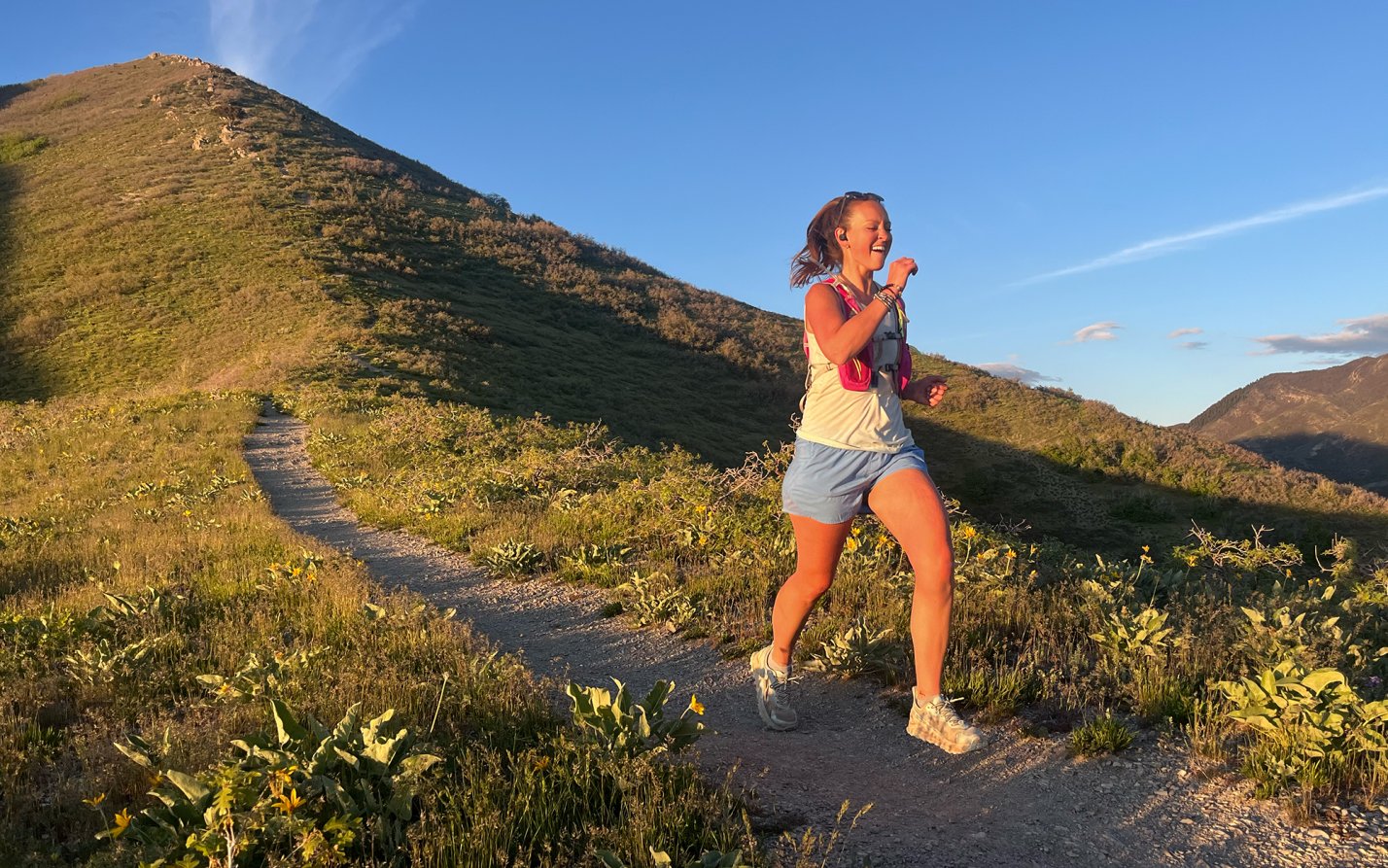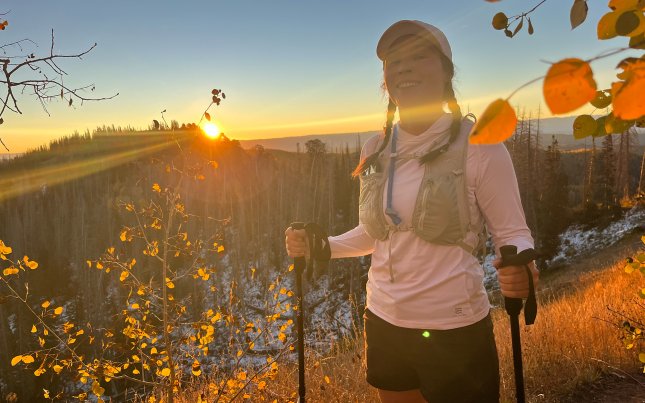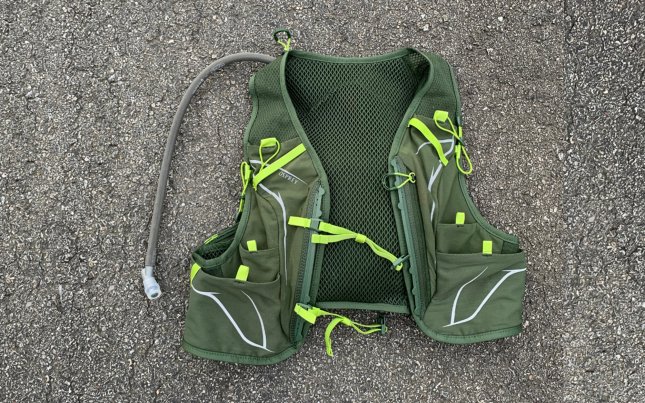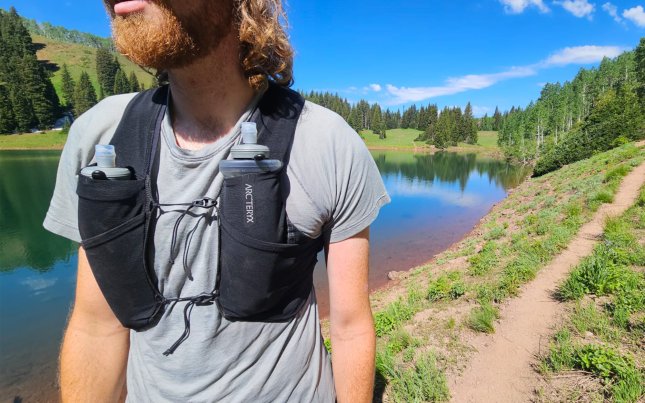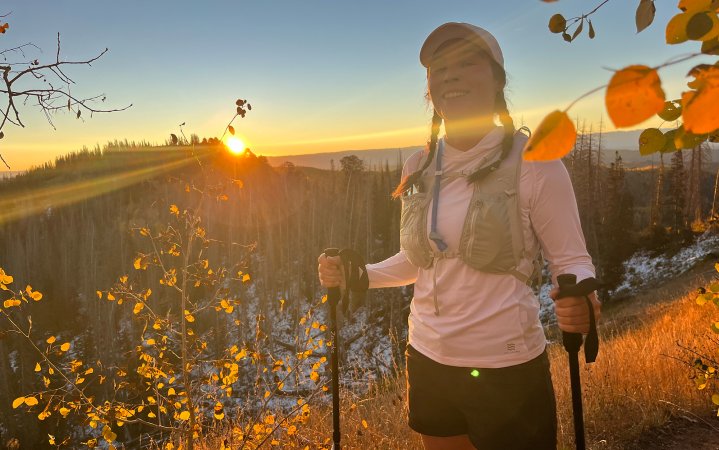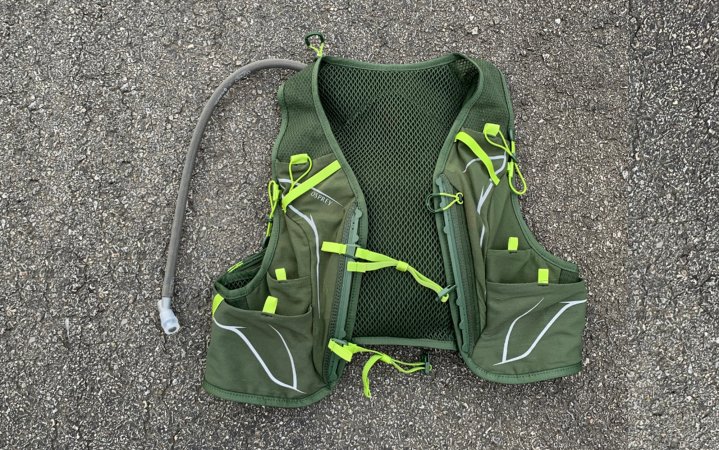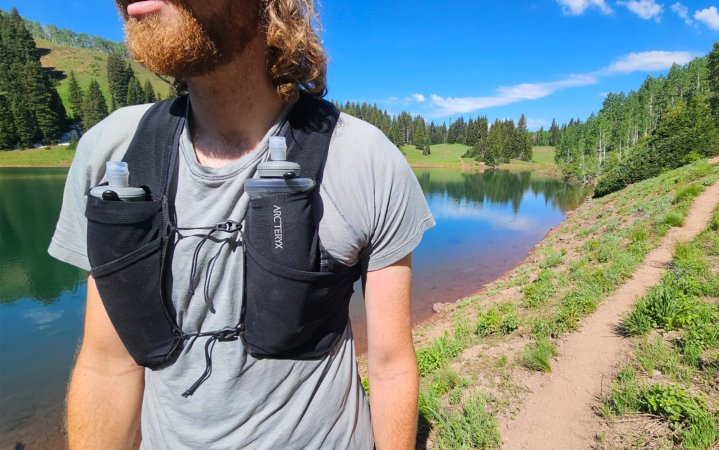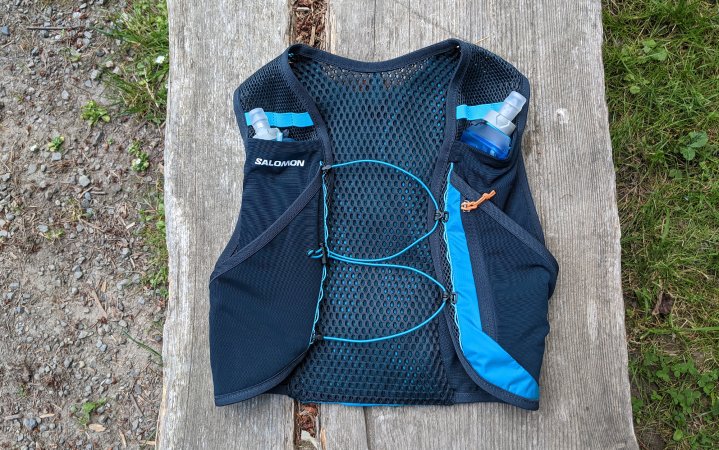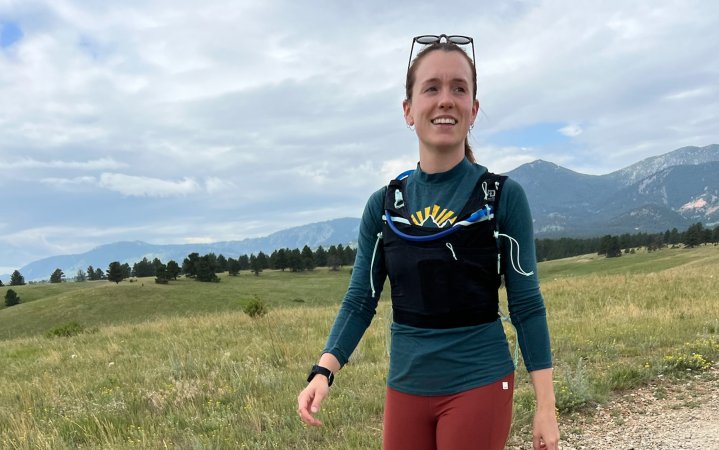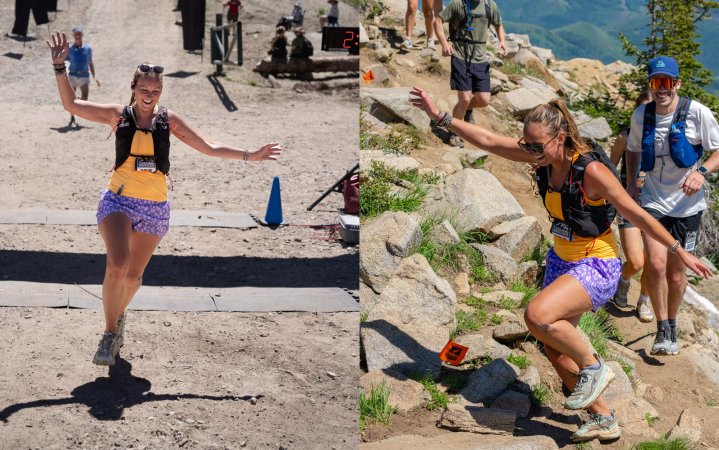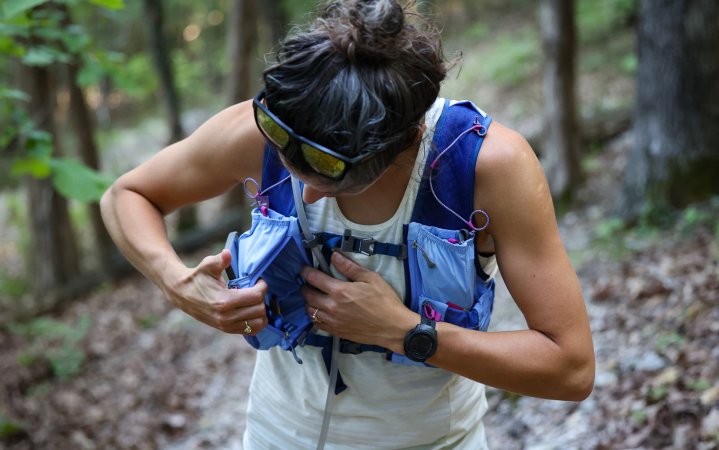We may earn revenue from the products available on this page and participate in affiliate programs. Learn More ›
The best running vests aren’t just for racers; they’re a lightweight and secure way to hold water, snacks, and whatever else you might need on short excursions and longer runs. They’re a great way to push yourself to go farther distances by keeping hydration and snacks easily accessible. If you are gearing up for a race, the best running vest is crucial to maintaining your pace and physical health with water, fuel, and first-aid. Seven runners with different goals and training grounds took out some of the best running vests this spring to help you choose the right pack for you.
- Best Overall: CamelBak Zephyr
- Best Value: Osprey Packs Duro 6
- Best Storage: Arc’teryx Norvan 14 Vest
- Best Minimalist: Salomon Active Skin 4
- Most Supportive: Ultimate Direction Xodus Vesta
- Norrona Senja 7L
- CamelBak Apex Pro
- Nathan Vapor Airess 3.0 7L
How We Tested the Best Running Vests

Seven testers cumulatively ran hundreds of miles in these running vests on roads, urban pathways, twisty single tracks, mountain scrambles, and rocky trails. Our runners wore the contenders in a range of spring and summer temperatures across the country: Washington, Utah, Colorado, Arkansas, Texas, and Maine.
Some testers were upgrading from carrying just a key or phone to having water and snacks on hand for themselves and their four-legged running buddies. Others were disappointed in their current vest or looking for even more storage. All of the best running vests are chafe-free and don’t encumber the runner by moving aggressively with each stride. Find out where these top models shine below.
Best Running Vests: Reviews & Recommendations
Best Overall: CamelBak Zephyr
Pros
- Detachable trekking pole quiver
- Secure fit
- Whistle
Cons
- One size
Key Features
- Sizes: One size, men’s and women’s
- Weight: 7.4 ounces
- Capacity: 11 liters
- Includes two 17-ounce Quick Stow flasks
- Compatible with hydration bladder
I’ve been running in the Zephyr for a year now, and it’s my go-to vest. I only trail run on mountains, so I love the ability to stow my trekking poles in the detachable quiver for the downhill. It’s breathable and secure with plenty of water capacity.

There’s room in the back for an extra layer and I keep my car key, snacks, phone, and AirPods case in the plethora of front pockets. It’s easy to adjust the bottom and chest sliding straps for an optimal fit and no jostling. I’ve run in fall layers and thin summer tank tops and it fits securely over any outfit.
I’m partial to hydration bladders and keep the chest flask pockets open for storage. I love the CamelBak bladder and the hose clips onto the chest easily. While I don’t typically run in oppressive heat, the Zephyr is breathable and doesn’t smell despite never washing it.

The materials are very lightweight and I love the color way. The light green hasn’t gotten dirty and doesn’t absorb heat. There are also reflectors for visibility. I think this is the ultimate all-around women’s vest for day hikes, long runs, and even to bring backpacking for a lightweight day pack away from camp.
Read Next: Best Trekking Poles
Best Value: Osprey Packs Duro 6
Pros
- Secure fit
- Easily adjustable
- Hydration hose pocket
Cons
- Sensitive hydration bladder nozzle
Key Features
- Sizes: S, M, L
- Weight: 15 ounces
- Includes 1.5-liter hydration bladder
- Capacity for two soft flasks
After giving up on a flopping fanny pack that threw off his pace, OL social media manager Derek Horner started leaving his phone (and tunes) at home for unencumbered runs. But The Osprey Duro 6 now gives him the space to carry water, his phone, and a small first aid kit. Horner used this vest for his daily running routine on mixed trails and pavement. He also brought it on a trip to Acadia National Park for a 5-mile run with his dog Barley.

Horner loved how simple it was to latch the vest closed for a secure fit and easily take it off. Barley appreciated the extra water on their dry adventure. The pockets keep items easily accessible and the adjustability provides an optimal fit with no movement. The hose fits into a small pocket on the front to keep the nozzle from getting dusty.
The hydration bladder mouthpiece was apt to leaking with even slight pressure. Horner said if his arm hit the hose pocket while running he would get a little wet. The water in the bladder jostled, but the vest itself did not bounce or chafe. Roomy but not bulky, there’s capacity for more gear than Horner packed.
Our tester will continue to use the Duro 6 for his daily running routine, and plans to wear it during summer scouting missions in preparation for deer season. “It will be nice to have while doing short hikes to check trail cameras and look for deer sign,” says Horner.
Best Storage: Arc’teryx Norvan 14 Vest
Pros
- Room for extra gear
- Recco
Cons
- Not hydration bladder compatible
Key Features
- Sizes: XS, S, M, L
- Weight: 15 ounces
- Includes two 17-ounce hydration flasks
- Recco
The Norvan has the largest capacity of the vests we tested at 14 liters. Tester Brady Evans was looking for a streamlined pack to hold technical gear for longer mountain trail runs. He was able to carry an ice ax, crampons, climbing shoes, snacks, and extra water for a 3,000-feet, fifth-class scramble.
Evans didn’t experience any jostling as long as the chest was snug, otherwise the two half-liter bottles on the front could move. Arc’teryx includes two hydration flasks, but the pack does not have a hole for a hydration bladder hose to connect, so Evans packed an extra water bottle in the main compartment. While everything fits well, you can only access the main compartment from the top of the pack.

There’s a side pocket system with bungees for trekking poles and two ice ax attachment points. Evans’ only complaints were that his Samsung Galaxy S23 Ultra is too big for the easy-access front pockets and the main closure isn’t as weatherproof as he’d like it to be.

There aren’t many fail points — no zippers and easily replaceable cords — so it should last a long time. This vest might be overkill for your daily run, but the increased capacity allows for extra gear on technical peaks and fast trekking, or more fuel for longer days.
Best Minimalist: Salomon Active Skin 4
Pros
- Zig zag bungee front closure
- Plenty of storage
- Trekking pole quiver
Cons
- Awkward head tilt to drink water
- Must stop to de-layer
Key Features
- Sizes: XS, S, M, L, XL
- Weight: 9 ounces with flasks
- Includes two 17-ounce soft flasks
- Compatible with 1.5-liter hydration bladder
For an extreme minimalist like OL senior staff writer Laura Lancaster, I thought a 4-liter running vest would be perfect. Instead of throwing a house key in her pocket and hitting the mixed pavement and dirt trails along Lake Washington, she loaded up her Salomon Active Skin with 1 liter of water and her phone.

She ended up loving the bungee cord closure because it was “not particularly noticeable and very comfortable.” This method did a good job of securing the vest to ensure there was no movement or chafing. Lancaster also mentioned she might ditch her second sports bra when using this vest, thanks to the added support.
While Lancaster didn’t fill this vest to its storage or water capacity, she noted that the back zipper will be nice for a base layer on cold weather runs. Though, she was disappointed that you have to come to a complete stop to take off and stow said layer. The back panel is too narrow for on-the-go stuffing. She also had to tilt her head awkwardly to drink from the front flasks without removing them.
In the end, Lancaster wanted something even more minimalist for her 20 weekly miles, but I still think this is a great option for shorter runs. The Active Skin has the capacity to bring 2.5 liters of water and an extra layer for short day hikes as well. It’s so lightweight that I wouldn’t mind throwing it in my backpacking backpack on relaxed trips to use on a side-quest from camp.
Most Supportive: Ultimate Direction Xodus Vesta
Pros
- Molded fit
- Plenty of storage
Cons
- Hot
Key Features
- Sizes: XS, S, M, L
- Weight: 7.8 ounces
- Capacity: 6.5 liters
- Includes two BPA-free 17-ounce soft flasks
- Compatible with a 1.5-liter hydration bladder
This tester was looking for adjustability and security in a running vest, and OL contributor Katie Hill found it in the Xodus Vesta. She was able to achieve an optimal and sturdy fit thanks to the enclosed structure and cord lacing on the sides. She used a hydration bladder instead of the dual bottles to get a “flush fit on [her] larger chest.” Hill says, “I can imagine for women with smaller busts, having the dual bottles on the front of the vest would work really well.”
Hill was running in the Texas heat, so she only wore a high impact sports bra or a light tank top underneath the Xodus Vesta. She didn’t experience any chafing, despite multiple skin contact points, and even left her chafing stick at home. Hill compared the material to a normal sports bra rather than the plasticky material you might expect on a backpack.
The Xodus Vest and Vesta only come in black colorways, absorbing heat. Hill also said the material wasn’t the most breathable. But she was able to dump heat at stops via the side zipper.

The vest did shift around slightly, but Hill noted she probably could have sized down from the medium. “The hydration bladder sleeve and overall elasticity of the vest does allow for a little jostling and bouncing, unfortunately,” she says. “But I also was able to breathe deeper than I ever could on a run in my old vest, which was a huge bonus.”
Hill packed gels, a phone, keys, wireless earbuds, sunglasses, a credit card, and an ID into the 16 pockets on the Xodus. While there was adequate storage capacity, she did have to occasionally root around for her items because some of the pockets are connected, swallowing smaller items.
Ultimate Direction’s Xodus Vesta is great for a flexible but body-hugging fit. Hill was a big fan of the side zipper and elastic lacing for perfect fit. She says, “This vest actually molds to my body, despite having a bigger chest and a smaller waist which usually complicates running vests for me.” Hill is excited to add more layers to reduce the movement, and stow her bear spray in the convenient front pocket when she returns to Montana.
Read Next: Best Chafing Sticks
Norrona Senja 7L
Pros
- Water-resistant zippers
- Roomy
- Whistle
Cons
- Not hydration bladder compatible
Key Features
- Sizes: S/M, L/XL
- Weight: 11 ounces
- Includes two 17-ounce soft flasks
The Norrona Senja is an aesthetically pleasing matte green with black accents. It is comfortable to wear, hugging your body for stability. The harness has more coverage than my go-to CamelBak Zephyr, and feels as though it has more storage even though the capacity is 4 liters less, probably due to the lack of a hydration bladder in the back. The Senja comfortably fits an extra layer, two summit beers, snacks, and a liter of water.

The vertical zipper is designed to allow you to reach into the back of your pack without taking it off. It mostly works, though if I need an extra layer, I’ll take the pack off anyway so I didn’t utilize this feature much. In the winter I can see it being nice to stow a hat or gloves without bulking up the chest pockets.

You can affix trekking poles to two gear loops on the outside, but I went ahead and mostly enclosed mine inside the main compartment. The tips stuck out, but the zipper is strong and didn’t come unzipped despite being partially open.
I love the weather resistant finish and zipper for peace of mind in damp conditions. Norrona’s Senja is ideal for runners looking for a comfortable fit and to maximize their storage space.
CamelBak Apex Pro
Pros
- Detachable trekking pole quiver
- Water resistant zipper pocket
- Whistle
- Recco
Cons
- Hydration bladder compartment doesn’t close
Key Features
- Sizes: XS, S, M, L
- Weight: 12 ounces
- Capacity: 12 liters
- Includes two 17-ounce Quick Stow flasks
- Hydration bladder compatible
- Recco
Tester Kelsey Corr wore the Apex Pro on a mountain trail running race to store her hydration bladder, energy Gu’s, phone, and snacks. She thought the vest felt secure and she liked the front pockets for easy access to fuel and headphones. Opting for a hydration reservoir over the included bottles, she used the front bungee pocket for her phone, but noted that if the pocket were lower it would be easier to pull out her device.

The main compartment on the back of the pack has a weatherproof zipper for extra layers and additional supplies, but the separate bladder compartment doesn’t close. The fit is stretchy and hugs you securely.
At 12 liters of capacity, there’s a good amount of room for extra layers and even a light lunch and summit beer. The removable trekking pole quiver is a good option for longer days, and without it the Apex is race ready.
Nathan Vapor Airess 3.0 7L
Pros
- Lots of storage
- Large water capacity
- Ideal fit
Cons
- Hydration hose magnet isn’t very useful
- Noisy
- No built-in odor control
Key Features
- Sizes: XXS-M, L-XXL, 1X-3X
- Weight: 13.0 ounces with bladder
- Includes 2 liter hydration bladder
- Front pockets fit bottles and flasks up to 22 ounces
OL executive editor Natalie Krebs loaded up the Nathan Vapor Airess for training runs in preparation for the New York City Marathon and to tire out her 3-year-old bird dog Hatchet on rocky and rooted single-track mountain bike trails. Under hot and humid conditions in Northern Arkansas, she put Nathan’s breathability claims to the test. The cropped fit akin to a “cargo sports bra,” limits how much heat can get trapped, and it didn’t stifle Krebs’ stride during a 100-degree heat wave.

The initial fit allowed for some uneven slouching until Krebs followed Nathan’s “pull for perfect fit” tag to a hidden strap inside pockets on either side. This tightens the bottom of the vest while the adjustable chest straps secure the front for an optimal fit.

She didn’t experience any movement or chaffing from the vest itself, even in just a thin tank or only a sports bra. Krebs is a hunter used to silent gear, so while the movement was minimal, the noise of the crinkling nylon did bother her.

This 7-liter pack includes a hydration bladder and has the capacity for dual flasks on the front. The storage options will feel excessive to some people, although for Krebs it’s appealing. She stashed it with two liters of water, a peeled-off shirt, e-collar remote, cell phone, dog bags, Airpod case, and two gels. The vest has nearly 11 pockets (nine secured by a cinch or zipper). Krebs jumped around and leaned over at various points throughout her runs and none of her belongings ever came loose. There are additional bungees to affix extra layers or trekking poles as well.
Read Next: Best Dog Training Collars
This vest is ideal for long runs where you want to carry more water and food. It’s also a great crossover pack for day hikes. Krebs’ only major complaint was the hydration hose, which is too long for the included magnetic fastener, which is not strong enough or placed correctly to be useful. The tube either needs to be cut to length (Nathan has a video explaining how to trim the hose) or tucked into one of the vest’s many loops across the chest as a workaround.
After 40 miles of running in the Arkansas summer heat, this vest has started to smell a little ripe. Some odor control would be appreciated in a piece of gear most people are going to sweat through on every run. The care instructions only recommend hand washing, and it’s a pain to unpack and repack a vest you might use multiple times a week.
Things to Consider Before Buying the Best Running Vest

Capacity
The storage capacity of the vests we tested ranges from 4 to 14 liters. The 4- to 7-liter packs offer plenty of stable storage for daily runs, while the 11- to 14-liter packs have room for additional gear on longer adventures. Think about what you’ll be packing on most of your runs before committing to a size. Some vests also have specific attachments for trekking poles and ice axes for mountain pursuits.
Hydration
For many, hydration is the number one reason they want a running vest. It’s a great way to keep water handy without holding a water bottle or enduring a bouncing backpack. The running vests on this list might include soft flasks or a bladder and some are equipped for both.
Comfort
If your typical runs are hot and sweaty, take breathability and colorways (dark versus light) into account. Also take a few practice paces wearing your vest with the tags on when you first unbox it or try it on. If there’s any annoying movement or uncomfortable points, these are only going to be exacerbated with actual exercise and you may need a different size or model.
Final Thoughts
Push yourself further and faster by giving yourself access to adequate hydration and fuel on your runs. The best running vests don’t jostle or chafe and provide easy access to everything you need on daily runs, short hikes, or bike rides.
- Best Overall: CamelBak Zephyr
- Best Value: Osprey Packs Duro 6
- Best Storage: Arc’teryx Norvan 14 Vest
- Best Minimalist: Salomon Active Skin 4
- Most Supportive: Ultimate Direction Xodus Vesta
- Norrona Senja 7L
- CamelBak Apex Pro
- Nathan Vapor Airess 3.0 7L
